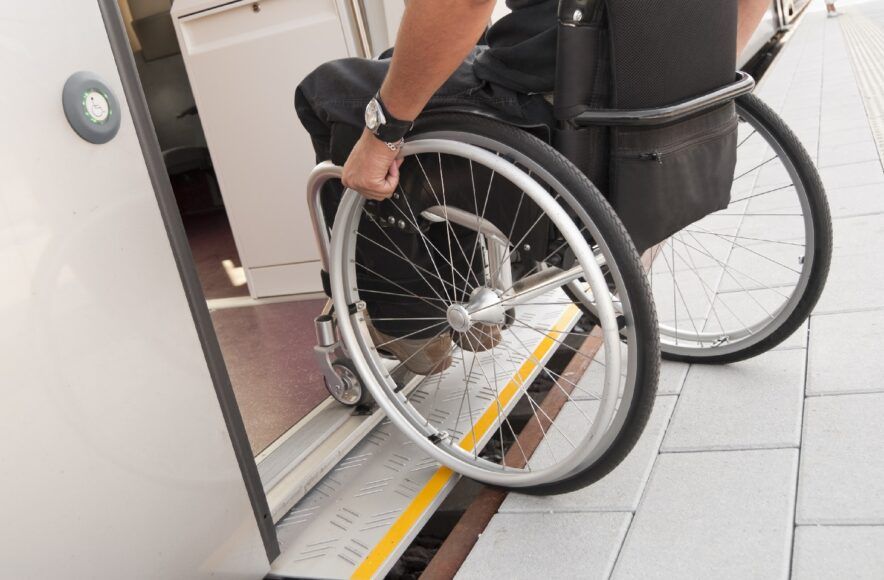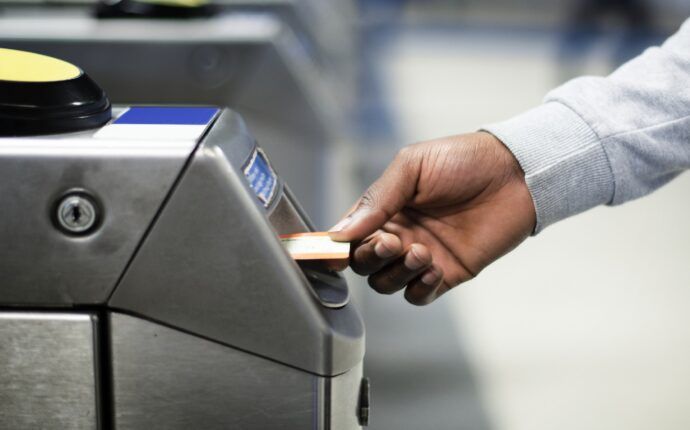Transport companies are letting disabled people down – and losing money because of it.

This Disability History Month, reasonable adjustments on trains and buses are more essential than ever.
If you take a look at some of the headlines this past year, you might begin to think that the UK is experiencing a transport accessibility crisis. From Paralympian Baroness Tanni Grey-Thompson being forced to crawl off a train, to the shocking revelations in Sophie Morgan’s Fight to Fly, these events remind us how important campaigning to change the status quo is.
Many disabled people know that, when it comes to making adaptations and reasonable adjustments for disabled people, companies big and small, public and private will focus only on the barest essentials. They often ignore the inaccurately-named ‘would be nice’ adjustments that would actually bring access up to a level playing field. Of course, it also goes without saying that it’s not a matter of what would and wouldn’t be nice, since the Equality Act (2010) makes reasonable adjustments a vital legal duty.
United Response is currently undertaking a research project into disability hate crime (DHC) on public transport, and campaigning to make all forms of transport more accessible for disabled people. These aims are completely intertwined. Our ongoing survey has revealed that wheelchair spaces on buses and priority seats on trains can be hotspots for disability hate crime, since asking someone to move from one of these spaces can lead to disabled people facing abuse. Shockingly, our survey also shows that transport staff themselves can occasionally be a source of hostility.
Why should transport companies care about disabled people?
It’s simple. Transport providers should step up and make the changes disabled people need because the fair and just society we all want to see cannot exist without accessibility at its core. But what about those providers that just won’t listen? Profit is obviously a major concern for many of the companies that run Britain’s trains and buses, and there is no doubt it motivates them. In letting down disabled people, in not taking necessary steps to stamp out DHC, and in failing to adapt the systems they run to make them accessible, transport companies are alienating a demographic that makes up 17.7% of the population of England, and losing the fares they would pay if confidence in the system was restored.
Indeed, an interim finding from our survey revealed that a staggering 70.7% of people who had experienced disability hate crime on public transport were less willing to use those services in future. Adapting transport systems for disabled people shouldn’t be seen as simply throwing money into a black hole. Making investment in the system will generate returns, as those who don’t feel safe to travel return to our transport networks, and those who already travel find their journeys more accessible.

Accessible transport systems work better for everyone.
Another striking consideration is that the adjustments that disabled people are crying out for wouldn’t only benefit disabled people. Time and time again, the responses to our survey include requests for additional staff on trains and buses, making the British Transport Police more accountable, making reporting systems easier to use, updating legislation, and taking hate crime more seriously. There is no doubt that these changes would require investment, but they would benefit all of the millions of people who make journeys on the network every year. Providers must stop thinking of these as burdensome costs to improve services for a small minority, and instead think of them as general improvements to make life better for everyone using public transport.
The transport network of the UK has strived to become more accessible in recent decades, certainly, but there is still so much to be done. You only have to take a look at London’s Tube Map to see how many stations are still completely inaccessible to wheelchair users. Still, this Disability History Month, it’s important to reflect on the achievements of the disabled activists who secured so many of the hard-won adjustments that we enjoy today. It’s also just as important to keep fighting the good fight, and secure a more accessible future for the disabled people of tomorrow.
How can I help this Disability History Month?
From the 14th of November to the 20th of December, Disability History Month provides a time to reflect on the past, and strive for a better future. You can make your voice heard on this issue by filling in our DHC survey.
Click here to read the previous entry in the Experts on Disability Hate Crime blog, which reviews the recent release of hate crime stats from the Home Office. Further discussion of this issue, including updates on the DHC research project, will feature in the coming months.
Image credits © iStock.
- Dr Freddie Jobbins is a Disability Hate Crime Project Researcher for United Response